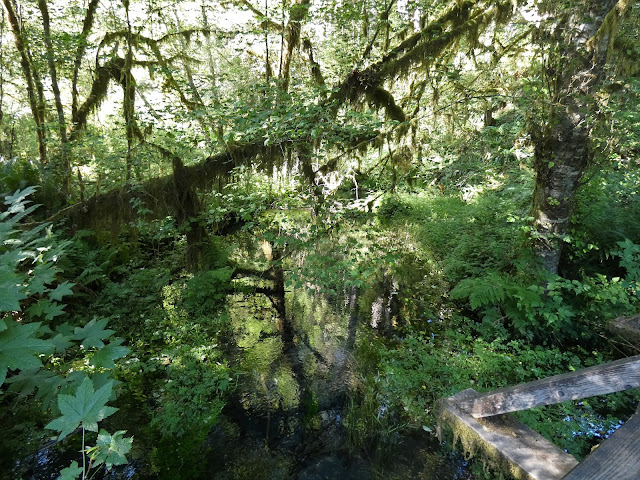Wednesday, August 22, 2018
Deep in the Hoh Rainforest of Olympic National Park in a Very Hot Summer
I am a mountain person. I'm a desert person. I like being in places where I can see vast distances, where I can navigate by prominent landmarks. I'm often spooked by dense forest environments where I can see only a few yards through the gloom and can't navigate well. I'm talking about map and compass orienteering, but I think a thick forest could disrupt GPS signals too. And what happens if the batteries go dead?
Just the same, when it came to choosing a vacation destination this summer, we headed to the northwest, and ultimately found ourselves camping in the Hoh Rainforest of Olympic National Park in Washington. In a summer of record-breaking heat, it was nice to find a cool and shady place. It was blissful.
The park was born out of controversy. The Olympic Peninsula is a mountainous landscape that captures vast amounts of precipitation from Pacific storms and the western side of the peninsula is especially lush with a temperate rainforest that was a magnet for timber interests. The huge trees were being harvested at a furious rate, and as the loggers worked their way farther into the interior, people became concerned about the wholesale destruction of the unique environment. Grover Cleveland established an Olympic Forest Reserve in 1897, and Theodore Roosevelt upgraded the status to a national monument in 1909. Congress acted in 1938 to designate the forest as a Olympic National Park. There is always a conflict between those who wish to make short-term profits versus those who recognize the need to preserve intact ecosystems with more intangible values such as clean air and water, wildlife diversity, education, recreation, and national pride.
We were lucky in our timing. We traveled in the middle of July instead of August. I was watching reports this week of a dense blanket of smoke from hundreds of fires in British Columbia covering the Pacific Northwest. And of course we haven't been spared here in California. We've had another horrific year of gigantic wildfires that have affected hundreds of thousands of acres, and we had weeks of smoky conditions related to the Ferguson Fire, the Donnell Fire, and dozens of others. There have also been firestorms of political controversy swirling about these fires.
Biologic and climate systems are complex, of course, but there are also some fundamental clear truths: the climate is getting warmer, and wildfires are getting worse. We are living the changes that were predicted thirty or more years ago by climate scientists, and the time we have for confronting the problems associated with warming is limited.
Unfortunately we also live in a time when politicians are in charge who deny climate change despite the overwhelming evidence that proves it is happening. The president says that climate change is not a factor in forest fires, that this is a "management situation", and that we need to "beautifully" remove fallen trees. Secretary of the Interior Zinke says we "have been held hostage by these environmental terrorist groups...that have refused to allow harvest of timber". These statements are highly misleading at best and display ignorance of the science.
Forests have been mismanaged. For more than a century a misunderstanding of how fire interacts with a forest environment has meant that fire suppression at all costs was the method of choice. This has indeed allowed overgrowth of young trees and a buildup of fuel on the forest floors. It is a problem though that has been exacerbated by the effects of drought and warming temperatures.
There are good ways of dealing with forests on public lands, and there are poor choices that allow a few to profit to the detriment of the rest of us. Clearing out fuel is needed given the new environmental regime that we now live in, but the best approaches will involve prescribed fires that burn out the undergrowth and allow mature trees to thrive, along with other more innovative approaches. Timber companies will say they can clear out the forests, but they invariably favor the big mature trees (that can better survive wildfires), or clear-cut the slopes and replant a single species of tree. This is tree-farming, not forest management. There are big changes coming in our beautiful forests, and a lot of them are not good. The last thing we need to be doing is letting a few people profit, leaving the forests in worse shape than they are now. Denying climate change is simply a pretext to allow a few people to profit from a resource that belongs to all of us.
That wasn't on my mind last month, though. I was instead reveling in the coolness and quiet of the trail we were following. It was late in the afternoon and we had the forest to ourselves (aside from a few deer and a smattering of birds...and a gross slug). It was a blessing to experience the living example of a great idea: to preserve parts of the primeval landscapes of our country for the good of all.
Subscribe to:
Post Comments (Atom)









No comments:
Post a Comment